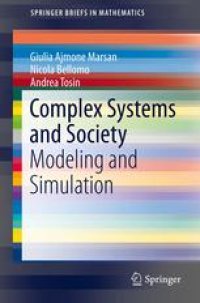
Ebook: Complex Systems and Society: Modeling and Simulation
- Tags: Mathematical Modeling and Industrial Mathematics, Game Theory/Mathematical Methods, Complex Systems, Social Sciences general, Game Theory Economics Social and Behav. Sciences, Applications of Mathematics
- Series: SpringerBriefs in Mathematics
- Year: 2013
- Publisher: Springer-Verlag New York
- Edition: 1
- Language: English
- pdf
This work aims to foster the interdisciplinary dialogue between mathematicians and socio-economic scientists. Interaction among scholars and practitioners traditionally coming from different research areas is necessary more than ever in order to better understand many real-world problems we face today. On the one hand, mathematicians need economists and social scientists to better address the methodologies they design in a more realistic way; on the other hand, economists and social scientists need to be aware of sound mathematical modelling tools in order to understand and, ultimately, solve the complex problems they encounter in their research. With this goal in mind, this work is designed to take into account a multidisciplinary approach that will encourage the transfer of knowledge, ideas, and methodology from one discipline to the other. In particular, the work has three main themes: Demystifying and unravelling complex systems; Introducing models of individual behaviours in the social and economic sciences; Modelling socio-economic sciences as complex living systems. Specific tools examined in the work include a recently developed modelling approach using stochastic game theory within the framework of statistical mechanics and progressing up to modeling Darwinian evolution. Special attention is also devoted to social network theory as a fundamental instrument for the understanding of socio-economic systems.
This work aims to foster the interdisciplinary dialogue between mathematicians and socio-economic scientists. Interaction among scholars and practitioners traditionally coming from different research areas is necessary more than ever in order to better understand many real-world problems we face today. On the one hand, mathematicians need economists and social scientists to better address the methodologies they design in a more realistic way; on the other hand, economists and social scientists need to be aware of sound mathematical modelling tools in order to understand and, ultimately, solve the complex problems they encounter in their research. With this goal in mind, this work is designed to take into account a multidisciplinary approach that will encourage the transfer of knowledge, ideas, and methodology from one discipline to the other. In particular, the work has three main themes: Demystifying and unravelling complex systems; Introducing models of individual behaviours in the social and economic sciences; Modelling socio-economic sciences as complex living systems. Specific tools examined in the work include a recently developed modelling approach using stochastic game theory within the framework of statistical mechanics and progressing up to modeling Darwinian evolution. Special attention is also devoted to social network theory as a fundamental instrument for the understanding of socio-economic systems.?
This work aims to foster the interdisciplinary dialogue between mathematicians and socio-economic scientists. Interaction among scholars and practitioners traditionally coming from different research areas is necessary more than ever in order to better understand many real-world problems we face today. On the one hand, mathematicians need economists and social scientists to better address the methodologies they design in a more realistic way; on the other hand, economists and social scientists need to be aware of sound mathematical modelling tools in order to understand and, ultimately, solve the complex problems they encounter in their research. With this goal in mind, this work is designed to take into account a multidisciplinary approach that will encourage the transfer of knowledge, ideas, and methodology from one discipline to the other. In particular, the work has three main themes: Demystifying and unravelling complex systems; Introducing models of individual behaviours in the social and economic sciences; Modelling socio-economic sciences as complex living systems. Specific tools examined in the work include a recently developed modelling approach using stochastic game theory within the framework of statistical mechanics and progressing up to modeling Darwinian evolution. Special attention is also devoted to social network theory as a fundamental instrument for the understanding of socio-economic systems.?
Content:
Front Matter....Pages i-xii
The Role of Individual Behaviors in Socio-Economic Sciences....Pages 1-10
Mathematical Tools for Modeling Social Complex Systems....Pages 11-32
Modeling Cooperation and Competition in Socio-Economic Systems....Pages 33-50
Welfare Policy: Applications and Simulations....Pages 51-68
Forward Look at Research Perspectives....Pages 69-81
Back Matter....Pages 83-90
This work aims to foster the interdisciplinary dialogue between mathematicians and socio-economic scientists. Interaction among scholars and practitioners traditionally coming from different research areas is necessary more than ever in order to better understand many real-world problems we face today. On the one hand, mathematicians need economists and social scientists to better address the methodologies they design in a more realistic way; on the other hand, economists and social scientists need to be aware of sound mathematical modelling tools in order to understand and, ultimately, solve the complex problems they encounter in their research. With this goal in mind, this work is designed to take into account a multidisciplinary approach that will encourage the transfer of knowledge, ideas, and methodology from one discipline to the other. In particular, the work has three main themes: Demystifying and unravelling complex systems; Introducing models of individual behaviours in the social and economic sciences; Modelling socio-economic sciences as complex living systems. Specific tools examined in the work include a recently developed modelling approach using stochastic game theory within the framework of statistical mechanics and progressing up to modeling Darwinian evolution. Special attention is also devoted to social network theory as a fundamental instrument for the understanding of socio-economic systems.?
Content:
Front Matter....Pages i-xii
The Role of Individual Behaviors in Socio-Economic Sciences....Pages 1-10
Mathematical Tools for Modeling Social Complex Systems....Pages 11-32
Modeling Cooperation and Competition in Socio-Economic Systems....Pages 33-50
Welfare Policy: Applications and Simulations....Pages 51-68
Forward Look at Research Perspectives....Pages 69-81
Back Matter....Pages 83-90
....